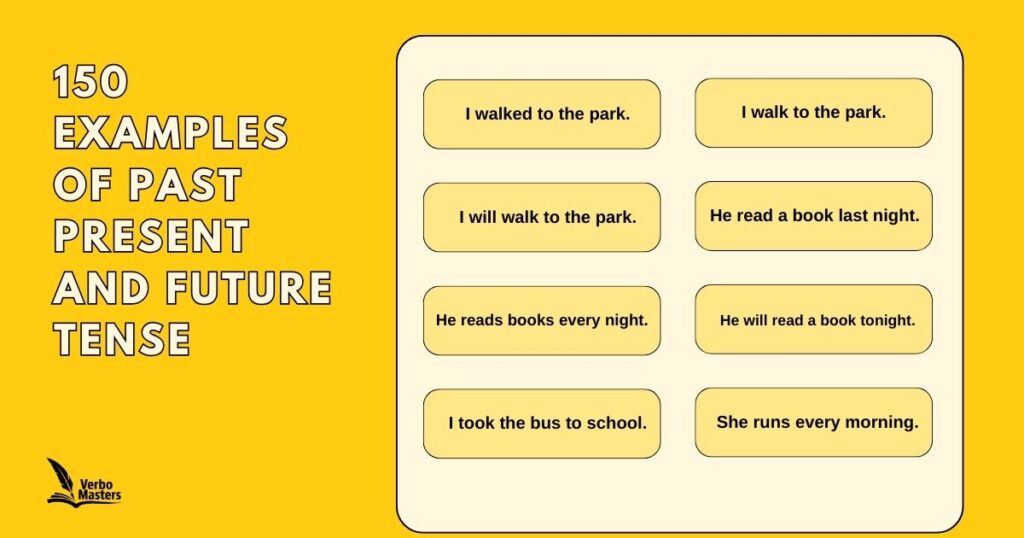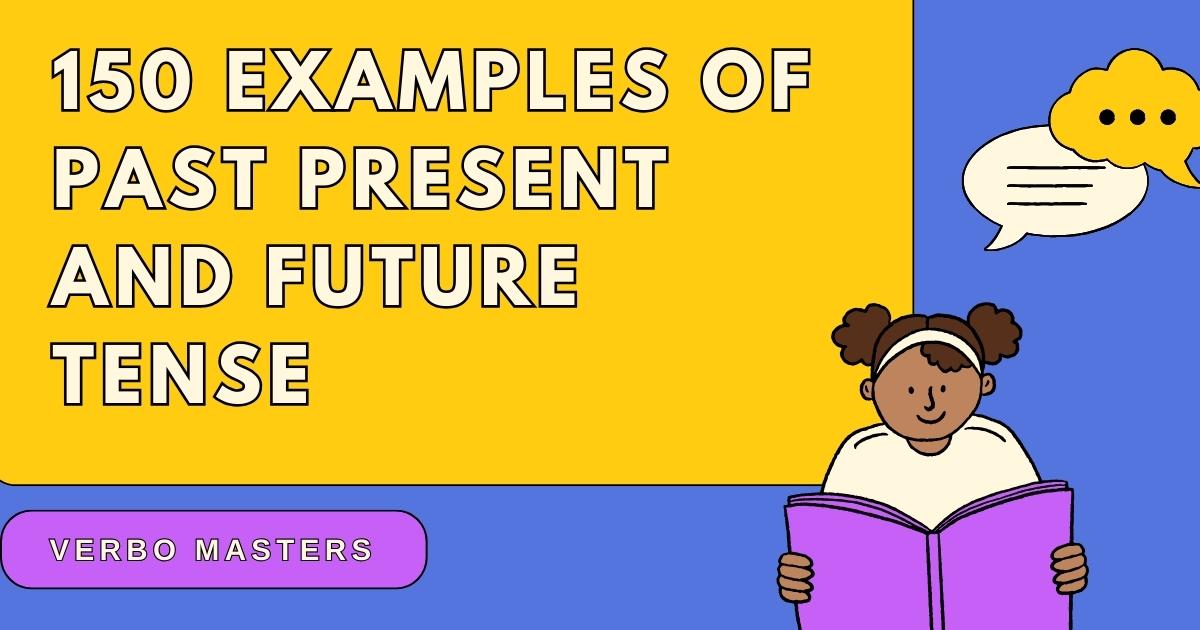Tenses are essential in English grammar as they help indicate when an action takes place whether in the past, present, or future. Each tense has its own structure and use, helping to clarify the timeline of events. The past tense refers to actions that have already happened, the present tense is used for actions happening now, and the future tense indicates actions that will happen later.
Understanding and using tenses correctly is key to clear communication. For example, in the past tense, we might say “I walked to the store,” while in the present tense, it’s “I walk to the store.” In the future, we’d say “I will walk to the store.
150 examples of sentences to help you master past, present, and future tenses.
You can also read; Learn Adverb Definition 200 example With Sentence
150 Examples of Past Present and Future Tense

| Past Tense | Present Tense | Future Tense |
| I walked to the park. | I walk to the park. | I will walk to the park. |
| She cooked dinner yesterday. | She cooks dinner every day. | She will cook dinner tomorrow. |
| They played football last weekend. | They play football every weekend. | They will play football next weekend. |
| He read a book last night. | He reads books every night. | He will read a book tonight. |
| We visited the museum last week. | We visit the museum every month. | We will visit the museum next week. |
| I traveled to Paris last summer. | I travel to Paris every year. | I will travel to Paris next year. |
| She studied for the test yesterday. | She studies every day for her exams. | She will study for the test tomorrow. |
| He worked at the company for five years. | He works at the company every day. | He will work at the company next year. |
| They finished their project yesterday. | They finish their projects on time. | They will finish their project next week. |
| We saw a movie last night. | We see movies every weekend. | We will see a movie next weekend. |
| I took the bus to school. | I take the bus to school every day. | I will take the bus to school tomorrow. |
| She ran a marathon last year. | She runs every morning. | She will run a marathon next year. |
| They visited their grandparents last holiday. | They visit their grandparents every holiday. | They will visit their grandparents next holiday. |
| He ate pizza for dinner. | He eats pizza once a week. | He will eat pizza next Friday. |
| We danced all night at the party. | We dance every Friday night. | We will dance at the party next month. |
| She painted a beautiful picture last week. | She paints a picture every weekend. | She will paint a picture next weekend. |
| I met her at the concert. | I meet her at the concert every year. | I will meet her at the concert next year. |
| He sang his favorite song at the event. | He sings his favorite song every day. | He will sing his favorite song at the event. |
| They went to the beach last weekend. | They go to the beach every summer. | They will go to the beach next summer. |
| We stayed in a hotel during our vacation. | We stay in a hotel when we travel. | We will stay in a hotel during our vacation. |
| I drank coffee this morning. | I drink coffee every morning. | I will drink coffee tomorrow morning. |
| She wrote a letter yesterday. | She writes letters to her friends. | She will write a letter tomorrow. |
| He met with his friends last night. | He meets with his friends every week. | He will meet with his friends next weekend. |
| We swam in the pool yesterday. | We swim in the pool every weekend. | We will swim in the pool tomorrow. |
| She cleaned the house last weekend. | She cleans the house every week. | She will clean the house next weekend. |
| I talked to my parents last night. | I talk to my parents every day. | I will talk to my parents tomorrow. |
| They walked to the store yesterday. | They walk to the store every day. | They will walk to the store tomorrow. |
| He played the guitar last night. | He plays the guitar every evening. | He will play the guitar tomorrow night. |
| We went to a concert last month. | We go to concerts regularly. | We will go to a concert next month. |
| I finished my homework last night. | I finish my homework every day. | I will finish my homework tonight. |
| She visited her friend last week. | She visits her friend every weekend. | She will visit her friend next weekend. |
| They traveled to Italy last summer. | They travel to Italy every summer. | They will travel to Italy next summer. |
| I played basketball yesterday. | I play basketball every week. | I will play basketball tomorrow. |
| She sang in the choir last Sunday. | She sings in the choir every Sunday. | She will sing in the choir next Sunday. |
| He drove to work yesterday. | He drives to work every day. | He will drive to work tomorrow. |
| We watched a movie last night. | We watch movies every Friday night. | We will watch a movie next Friday night. |
| I studied for the exam last night. | I study for exams regularly. | I will study for the exam tomorrow night. |
| They bought a new house last year. | They buy a new house every few years. | They will buy a new house next year. |
| She painted the walls yesterday. | She paints the walls every year. | She will paint the walls next year. |
| We visited the zoo last weekend. | We visit the zoo every month. | We will visit the zoo next month. |
| I ate at the restaurant last night. | I eat at the restaurant once a week. | I will eat at the restaurant tomorrow night. |
| He ran 5 miles yesterday. | He runs 5 miles every day. | He will run 5 miles tomorrow. |
| They celebrated their anniversary last month. | They celebrate their anniversary every year. | They will celebrate their anniversary next month. |
| I watched the game yesterday. | I watch the game every Sunday. | I will watch the game next Sunday. |
| She danced at the party last night. | She dances at the party every month. | She will dance at the party next month. |
| He called me yesterday. | He calls me every evening. | He will call me tomorrow. |
| We visited the park yesterday. | We visit the park every Saturday. | We will visit the park next Saturday. |
| She went shopping yesterday. | She goes shopping every weekend. | She will go shopping next weekend. |
| I worked late last night. | I work late every Friday. | I will work late tomorrow night. |
| Present Tense | Future Tense | Past Tense |
| I walk to the store every morning. | I will walk to the store tomorrow morning. | I walked to the store yesterday morning. |
| She sings every day in the choir. | She will sing tomorrow at the concert. | She sang beautifully yesterday. |
| They play soccer every Saturday. | They will play soccer next weekend. | They played soccer last Saturday. |
| He reads books every week. | He will read a new book next week. | He read a great book last week. |
| We visit our grandparents every summer. | We will visit our grandparents this summer. | We visited our grandparents last summer. |
| I take the bus to work every day. | I will take the bus to work tomorrow. | I took the bus to work yesterday. |
| She works at the office every weekday. | She will work at the office next week. | She worked at the office last week. |
| They eat lunch at noon every day. | They will eat lunch at noon tomorrow. | They ate lunch at noon yesterday. |
| He watches TV every night. | He will watch TV tonight. | He watched TV last night. |
| We study at the library every evening. | We will study at the library tomorrow evening. | We studied at the library last evening. |
| She writes in her journal every day. | She will write in her journal tomorrow. | She wrote in her journal last night. |
| He drives to work every day. | He will drive to work tomorrow. | He drove to work yesterday. |
| We clean the house every Saturday. | We will clean the house next Saturday. | We cleaned the house last Saturday. |
| I meet my friends every weekend. | I will meet my friends next weekend. | I met my friends last weekend. |
| She plays the piano every morning. | She will play the piano tomorrow morning. | She played the piano this morning. |
| They help with the chores every evening. | They will help with the chores tomorrow evening. | They helped with the chores last night. |
| We swim at the beach every summer. | We will swim at the beach next summer. | We swam at the beach last summer. |
| I walk my dog every day. | I will walk my dog tomorrow. | I walked my dog yesterday. |
| She practices yoga every morning. | She will practice yoga tomorrow morning. | She practiced yoga this morning. |
| They attend meetings every Monday. | They will attend meetings next Monday. | They attended meetings last Monday. |
| We enjoy hiking every fall. | We will enjoy hiking this fall. | We enjoyed hiking last fall. |
| I visit my parents every holiday. | I will visit my parents next holiday. | I visited my parents last holiday. |
| She loves shopping every weekend. | She will love shopping next weekend. | She loved shopping last weekend. |
| He finishes his work early every Friday. | He will finish his work early tomorrow. | He finished his work early last Friday. |
| We have dinner at 6 PM every evening. | We will have dinner at 6 PM tomorrow. | We had dinner at 6 PM yesterday. |
| I go for a run every morning. | I will go for a run tomorrow morning. | I went for a run this morning. |
| They go to the gym every week. | They will go to the gym tomorrow. | They went to the gym last week. |
| She makes breakfast every morning. | She will make breakfast tomorrow morning. | She made breakfast this morning. |
| Past Tense | Present Tense | Future Tense |
| I ran a marathon last year. | I run every morning to stay fit. | I will run another marathon next year. |
| They swam in the ocean last vacation. | They swim in the pool every weekend. | They will swim in the ocean next summer. |
| We watched the sunrise last weekend. | We watch the sunrise every weekend. | We will watch the sunrise tomorrow. |
| She wrote a book last year. | She writes a book every year. | She will write a book next year. |
| He sold his old car last month. | He sells cars for a living. | He will sell his car next week. |
| I visited Paris last holiday. | I visit Paris every holiday. | I will visit Paris next holiday. |
| We took the train yesterday. | We take the train every day to work. | We will take the train tomorrow. |
| She organized a meeting last week. | She organizes meetings every week. | She will organize a meeting next week. |
| He invited me to the party last night. | He invites me to the party every year. | He will invite me to the party next year. |
| I made a new recipe yesterday. | I make new recipes every weekend. | I will make a new recipe this weekend. |
| They cleaned the kitchen yesterday. | They clean the kitchen every day. | They will clean the kitchen tomorrow. |
| We enjoyed the concert last night. | We enjoy concerts every year. | We will enjoy the concert next year. |
| She studied abroad last year. | She studies abroad every summer. | She will study abroad next summer. |
| I helped my friend with his homework yesterday. | I help my friend with his homework every day. | I will help my friend with his homework tomorrow. |
| They traveled to Italy last holiday. | They travel to Italy every summer. | They will travel to Italy next summer. |
| He fixed the sink yesterday. | He fixes things around the house every weekend. | He will fix the sink next weekend. |
| We stayed home last weekend. | We stay home every weekend to relax. | We will stay home next weekend. |
| She gave me a gift yesterday. | She gives me a gift every birthday. | She will give me a gift next birthday. |
| They laughed a lot yesterday. | They laugh a lot at jokes. | They will laugh at the joke tomorrow. |
| I baked cookies last night. | I bake cookies every Sunday. | I will bake cookies next Sunday. |
| We went to the zoo last month. | We go to the zoo every year. | We will go to the zoo next year. |
| I walked around the city yesterday. | I walk around the city every morning. | I will walk around the city tomorrow. |
| They watched a new series last weekend. | They watch a new series every weekend. | They will watch a new series next weekend. |
| She finished her work yesterday. | She finishes her work every day at 5 PM. | She will finish her work tomorrow at 5 PM. |
| I met a lot of new people last week. | I meet new people every day. | I will meet new people tomorrow. |
FAQs
What is a verb?
A verb is a word that expresses an action, occurrence, or state of being. It’s an essential part of a sentence that tells what the subject does or what happens to it.
What are the three tenses in English?
The three tenses in English are the past, present, and future. Each one shows when an action takes place, whether it’s in the past, currently, or in the future.
What is the difference between past, present, and future tense?
Past tense describes actions that have already happened. Present tense is used for actions happening now or regularly, and future tense describes actions that will happen later.
Can a sentence have more than one verb?
Yes, a sentence can have more than one verb. For example, “She sings and dances at the party.” Here, “sings” and “dances” are both verbs.
How do we form the past tense of regular verbs?
To form the past tense of regular verbs, simply add “ed” to the base form of the verb. For example, “talk” becomes “talked,” and “jump” becomes “jumped.”
What is the base form of a verb?
The base form of a verb is its simplest, unconjugated form, such as “run,” “eat,” or “play.” It is used in the present tense, except when with third-person singular subjects.
What is the difference between action verbs and linking verbs?
Action verbs describe an action, like “run” or “write,” while linking verbs connect the subject to a description or state of being, like “am” or “is.”
What is an auxiliary verb?
An auxiliary verb, also called a helping verb, is used alongside the main verb to express tenses, moods, or voices. Examples include “is,” “are,” “have,” and “will.”
How do we use modal verbs?
Modal verbs, such as “can,” “may,” “should,” or “must,” express necessity, possibility, permission, or ability. They are used before the main verb to modify its meaning.
What is a transitive verb?
A transitive verb requires a direct object to complete its meaning. For example, in the sentence “She reads the book,” “reads” is a transitive verb, and “book” is the object.
Conclusion
Verbs are the foundation of a sentence, conveying action or linking ideas. They tell us what is happening, whether it’s an action like “run” or a state of being like “is.” Verbs help create meaning by connecting the subject of the sentence to what is being done or what exists.
Understanding the different tenses of verbs is crucial for clear communication. The past tense reflects actions that have already occurred, while the present tense shows things happening now. The future tense speaks of what is to come, allowing us to express time and sequence in our language.

I’m John Smith, a language enthusiast dedicated to helping writers, students, and professionals master the art of clear and effective communication. Whether you’re looking for grammar tips, writing guides, or common mistake corrections, you’ll find valuable insights to improve your language skills. Let’s make grammar simple and fun!

